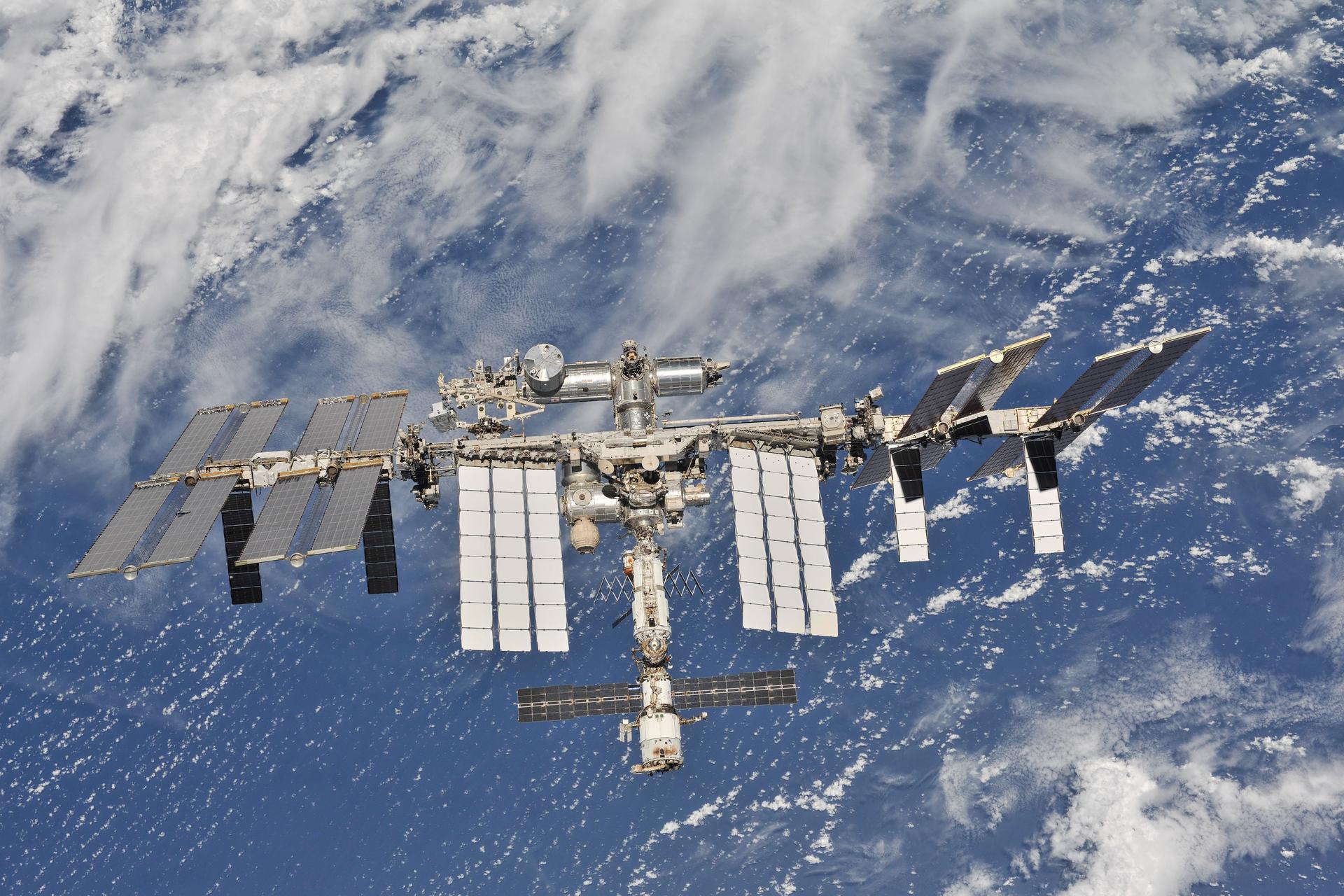How seriously should we take Russia's latest threat to leave the ISS?
Russia still left itself room to stay in the ISS program after 2024 if the country intends to do so, experts say.

Breaking space news, the latest updates on rocket launches, skywatching events and more!
You are now subscribed
Your newsletter sign-up was successful
Want to add more newsletters?

Delivered daily
Daily Newsletter
Breaking space news, the latest updates on rocket launches, skywatching events and more!

Once a month
Watch This Space
Sign up to our monthly entertainment newsletter to keep up with all our coverage of the latest sci-fi and space movies, tv shows, games and books.

Once a week
Night Sky This Week
Discover this week's must-see night sky events, moon phases, and stunning astrophotos. Sign up for our skywatching newsletter and explore the universe with us!

Twice a month
Strange New Words
Space.com's Sci-Fi Reader's Club. Read a sci-fi short story every month and join a virtual community of fellow science fiction fans!
Will Russia stay or will Russia go?
The country’s announcement today (July 26) that it plans to pull out of the International Space Station (ISS) consortium after 2024 sounds definitive. But the space community remains divided about how seriously to take that stated threat.
"What they mean is that the Russian decision to withdraw from participation in the station by 2024 is becoming firmer," John Logsdon, a space historian and policy analyst at George Washington University, told Space.com.
Related: Russia says it will leave the International Space Station after 2024
He said the announcement was a statement of intent by Russia to withdraw from the ISS partnership and to put its personnel and financial resources into developing an independent space station, which might be an early-stage "paper station" at this point.
Logsdon said the remaining space station consortium partners have probably been developing contingency plans for years, based on past comments by Russian space agency leadership. "I mean, that would be derelict duty if they haven't done anything," he said.
NASA Administrator Bill Nelson signaled, however, that the agency has not yet received a formal withdrawal notice from Roscosmos, Russia's federal space agency.
Breaking space news, the latest updates on rocket launches, skywatching events and more!
"NASA is committed to the safe operation of the International Space Station through 2030, and is coordinating with our partners," Nelson said in an emailed statement today. "NASA has not been made aware of decisions from any of the partners, though we are continuing to build future capabilities to assure our major presence in low-Earth orbit."
"We haven't received any official word from the partner as to the news today," Robyn Gatens, ISS director at NASA headquarters, said at the livestreamed ISS Research and Development Conference in Washington, D.C. this morning, according to SpaceNews.
She speculated that perhaps Russia was planning for a future space station after the ISS, along similar lines to NASA’s early-stage commercial space station efforts. "I think the Russians, just like us, are thinking ahead to what’s next for them," Gatens said.
The multinational ISS agreement is set to expire in 2024; last December, the White House announced its intention to extend the orbiting lab's operations to 2030. A semiconductor manufacturing bill before Congress includes a section on the ISS extension; an approval of the bill would formalize the U.S. intentions for an extension, according to past SpaceNews reports.
NASA's ISS program manager expressed confidence in the extension at the conference. "We're going to go to 2030, full up," Joel Montalbano said on stage. "Anybody who thinks that there is a different plan, you’re wrong. We’re going to 2030."
Montalbano added that the ISS partnership has had "struggles," but noted ways in which operations are continuing: He said he was in Moscow last week as part of an announced seat swap agreement to allow Russian cosmonauts to fly on American commercial vehicles, in exchange for U.S. astronaut seats on Russia's Soyuz spacecraft.
While Europe, Japan and Canada are on board with the proposed 2030 extension, ISS major partner Russia stands apart. That is a big deal in terms of how the ISS is constructed. The Russian and American sides of the ISS are highly interdependent, NASA has said; examples include the U.S. supply of power, and Russian availability of propulsion for orbital maneuvers.

In an ISS explainer updated in May, NASA emphasized that the space station cannot be broken apart, physically speaking. "Current interdependencies between each segment of the station prevent the US orbital segment and Russian segment from operating independently," NASA said, adding that detachment would pose "major logistical and safety challenges" due to difficulties in controlling the spacecraft, the interdependence of the software and numerous connections between the segments.
How the ISS would shift operations after a Russian departure, if at all, is a complex question. Logsdon said that ISS propulsion maneuvers are directed by Moscow's mission control, which would make it difficult for other partners to take over from the ground control segment. A private American Cygnus spacecraft performed the first U.S. boost of the space station last month, however, showing there might be an alternative path. That said, the spacecraft are not nearly as powerful as the current ISS propulsion system, Logsdon cautioned.
Who gets to use the facility in the event of a Russian withdrawal would also need to be worked out. "You can't take the other countries out," Logsdon said when asked if Russia would want exclusive use of its segment, absent the partnership. As for how the other countries might take over Russia's segment, Logsdon said that needs to be part of the discussions.
"Reacting to [the announcement] should be a collaborative thing," Logsdon said, alluding to the other ISS partners. He noted that, while Russia is one of the two principal ISS partners, it is "still a partner."
Anatoly Zak, a long-time reporter of Russian space news, said on Twitter that the "after 2024" language was so vague that it meant little. "'After 2024' can mean essentially any date," Zak wrote. "Likely NASA has nothing to worry about until at least 2030, or as long as the Zvezda service module — launched in 2000 — keeps functioning."
A spokesperson for space advocacy group The Planetary Society expressed doubt as well about the termination, comparing ongoing discussion about Russia's ISS status to the scientific controversy of whether water indeed exists on Mars. "We've seen this story many times before. Color me skeptical of any immediate changes," tweeted Casey Dreier, the nonprofit society's chief advocate and senior space policy advisor.
While Roscosmos has not taken any formal steps to date, under its last director the space agency did make numerous and inflammatory threats about leaving the ISS partnership.
Former Roscosmos chief Dmitry Rogozin was dismissed on July 15 following months of controversial public statements, including some related to Russia's ongoing invasion of Ukraine. For example, Roscosmos cosmonauts flew flags aboard the ISS early this month of two Russian-backed separatist territories in eastern Ukraine.
When asked how the ISS withdrawal might be related to Ukraine, Logsdon framed the withdrawal as "just one more step in relation to a fraught relationship. Of course," he continued, the Ukraine invasion "doesn't help."
Follow Elizabeth Howell on Twitter @howellspace. Follow us on Twitter @Spacedotcom and on Facebook.

Elizabeth Howell (she/her), Ph.D., was a staff writer in the spaceflight channel between 2022 and 2024 specializing in Canadian space news. She was contributing writer for Space.com for 10 years from 2012 to 2024. Elizabeth's reporting includes multiple exclusives with the White House, leading world coverage about a lost-and-found space tomato on the International Space Station, witnessing five human spaceflight launches on two continents, flying parabolic, working inside a spacesuit, and participating in a simulated Mars mission. Her latest book, "Why Am I Taller?" (ECW Press, 2022) is co-written with astronaut Dave Williams.
